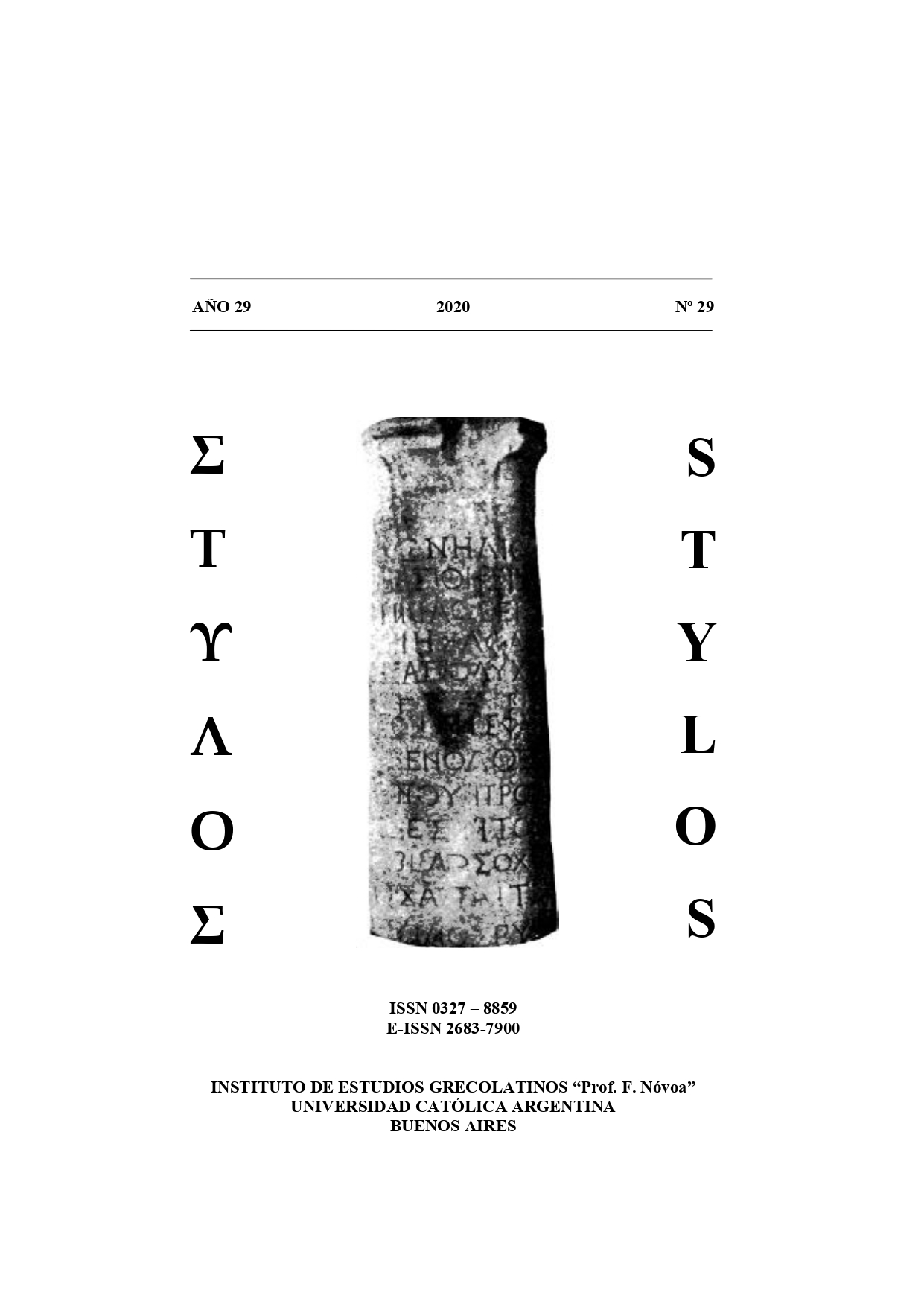DONDE HUBO ÉROS, PHILÍA QUEDA Eurípides, Troyanas 1051-1052
Keywords:
Euripides, Trojan Women, philia, eros, Eudemian Ethics.Abstract
This paper analyzes Euripides’ Trojan Women, focusing on the different aspects that the concept of philia involves therein. It finds several distinctive features in the significance that the concept of philia acquires in the speeches of Cassandra, Andromache and Hecuba, and in the verses devoted to describe Astyanax’ death. In this sequence, the analysis points out a relevant connection between eros and friendship.Downloads
References
ARISTÓTELES, Retórica, trad. Q. Racionero, Madrid: Gredos, 2020.
ARISTÓTELES, Ética Nicomaquéa. Ética Eudemia, trad. J. Pallí Bonet, Madrid: Gredos, 1985 (19984).
EURIPIDIS Fabulae, recognovit brevique adnotatione instruxit G. Murray, Tomus II Supplices, Hercules, Ion, Troiades, Electra, Iphigenia Taurica, Oxford: Oxford Clarendon Press, 1950 (1977).
EURIPIDE, Le Troiane, con Introduzione e Commento di G. Schiassi, Firenze: Vallecchi, 1953.
The Troades of Euripides, with revised text and notes by R. Tyrrell, New York: McMillan & Co., 1907.
EURIPIDES, An English Commentary on The Rhesus, Medea, Hippolytus, Alcestis, Heraclidae, Supplices, and Troades, by Ch. Anthon, New York: Harpen & Bros, 1877.
EURIPIDES, with an English Commentary by F. A. Paley, Vol. I: Rhesus, Medea, Hippolytus, Alcestis, Heraclidae, Supplices, Troades, Cambridge: Cambridge University Press, 2010 (1857).
EURÍPIDES, Tragedias III: Troyanas, Helena, Ifigenia en Áulide, intr.., trad. y notas de J. Tobías Nápoli, Buenos Aires: Colihue, 2016.
EURIPIDES, Trojan Women, translated by A. Shapiro, with intr. and notes by P. Burian, Oxford: Oxford University Press, 2009.
EURÍPIDES, Tragedias, Vol. II: Suplicantes, Heracles, Las Troyanas, Electra, Ifigenia entre los Tauros, intr.., trad. y notas de J.L. Calvo Martínez, Madrid: Gredos, 1978 (19851).
LIDDELL, J., SCOTT, R., JONES, H. S., A Greek-English Lexicon, Oxford: OUP, 1992.
CHANTRAINE, P., Dictionnaire Étymologique de la langue Grecque Histoire des Mots, París: Klincksieck, 1968.
BENVENISTE, É., Vocabulario de las instituciones indoeuropeas, Madrid: Taurus, 1983 (19691)
GILMARTIN, K., “Talthybius in the Trojan Women”, The American Journal of Philology, 1970 91. 2, 213-222.
JUNCO DE CALABRESE, E., “La expiación femenina de la guerra en Las Troyanas de Eurípides”, Valenciana, 2016 8.19, 125-145.
MAZZARA, G., Gorgia. La retorica del verosimile, Sankt Augustin: Academia Verlag, 1999.
SORKIN RABINOWITZ, N., “Trojan Women” 199-213. En: MCCLURY, L. (ed.), Companion to Euripides, Malden: Wiley Blackwell, 2017.
MERIDOR, R., “Creative rhetoric in Euripides’ Troades: some notes on Hecuba’s speech”, Classical Quarterly, 2000 50.1, 16-29.
PATON, W.R., “Quatre passages des Troyennes d’Euripide”, Revue des Études Grecques, 1914 27.121, 35-38.
POWELL, A. (ed.), Euripides, Women and Sexuality, London New York: Routledge, 1990 (2005).
QUINTANA TEJERA, L., “Las pasiones humanas: heroísmo, amor y muerte en un pasaje del canto VI de Ilíada”, La Colmena, 2007 53, 32-39.
RODRÍGUEZ CIDRE, E., “Muerte de la polis en la tragedia: Troya en Troyanas de Eurípides”, X Jornadas Interescuelas Departamentos de Historia, Rosario, 2005.
RODRÍGUEZ CIDRE, E, Cautivas Troyanas. El mundo femenino frag-mentado en las tragedias de Eurípides, Córdoba: Ediciones del Copista, 2010.
SULLIVAN, SH., Euripides’ Use of Psicological Terminology, Montreal London: McGill Queen’s University Press, 2000.
Downloads
Published
How to Cite
Issue
Section
License






